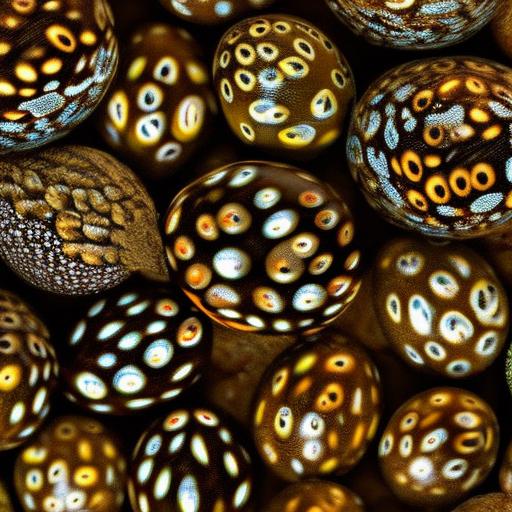Quail eggs are small, speckled eggs that come from the quail bird, a small game bird that is native to Europe, Asia, and Africa. These eggs are considered a delicacy in many parts of the world and are known for their rich, creamy flavor and high nutritional value. Quail eggs are often used in gourmet cooking and are prized for their small size and delicate texture. They are also popular in Asian cuisine, where they are often used in soups, salads, and as a topping for sushi.
Quail eggs are packed with nutrients, including high levels of protein, vitamins, and minerals. They are also lower in cholesterol than chicken eggs, making them a healthier alternative for those looking to reduce their cholesterol intake. Quail eggs are also known for their rich, creamy yolk and delicate flavor, making them a popular choice for gourmet dishes and appetizers. Whether you enjoy them boiled, fried, or pickled, quail eggs are a versatile ingredient that can add a touch of elegance to any meal.
Key Takeaways
- Quail eggs are small, nutritious, and versatile, making them a popular choice for cooking and snacking.
- Store quail eggs in the refrigerator at a consistent temperature to maintain their freshness and quality.
- Quail eggs have a shelf life of about 3-4 weeks when properly stored in the refrigerator.
- To tell if quail eggs are still fresh, perform a float test or check for any unusual odors or discoloration.
- Properly handle quail eggs by washing them before use, avoiding cracks or damage, and using them within a reasonable time frame.
- Quail eggs can be used in various cooking methods such as boiling, frying, pickling, and baking, adding a unique flavor and texture to dishes.
- In conclusion, keeping quail eggs fresh involves proper storage, handling, and regular checks for freshness, ensuring that they can be enjoyed in a variety of culinary applications.
Storage of Quail Eggs
When it comes to storing quail eggs, it’s important to keep in mind that they are more delicate than chicken eggs and require a bit more care. Quail eggs should be stored in the refrigerator at a temperature of around 45-50 degrees Fahrenheit. It’s best to store them in their original carton or in a covered container to protect them from absorbing strong odors from other foods in the fridge.
If you have a large quantity of quail eggs, you can also store them in an egg storage container specifically designed for quail eggs. These containers are designed to keep the eggs safe and secure while preventing them from rolling around and potentially cracking. It’s important to handle quail eggs with care when storing them to ensure that they remain fresh and intact.
Shelf Life of Quail Eggs
Quail eggs have a relatively long shelf life compared to other types of eggs. When stored properly in the refrigerator, quail eggs can last for up to 5-6 weeks. However, it’s important to note that the shelf life of quail eggs can vary depending on how fresh they were when you purchased them. It’s always best to check the expiration date on the carton and use the eggs within a reasonable amount of time to ensure their freshness.
It’s also important to keep in mind that quail eggs should not be stored at room temperature for an extended period of time, as this can cause them to spoil more quickly. To maximize the shelf life of quail eggs, it’s best to store them in the refrigerator as soon as possible after purchasing them. This will help to preserve their freshness and ensure that they remain safe to eat for as long as possible.
How to Tell if Quail Eggs are Still Fresh
There are several ways to tell if quail eggs are still fresh and safe to eat. One of the easiest methods is to perform the float test. Simply fill a bowl with water and gently place the quail eggs in the water. If the eggs sink to the bottom and lay flat on their sides, they are still fresh and safe to eat. If they stand upright on the bottom or float to the surface, they should be discarded as they are no longer fresh.
Another way to check the freshness of quail eggs is to gently shake them next to your ear. If you hear a sloshing sound, this could indicate that the egg has spoiled and should not be consumed. Additionally, you can also crack open the egg and inspect the yolk and white for any unusual odors or discoloration. Fresh quail eggs should have a clean, mild scent and vibrant yolks.
Proper Handling of Quail Eggs
Proper handling of quail eggs is essential for maintaining their freshness and quality. When handling quail eggs, it’s important to be gentle and avoid dropping or jostling them, as they are more delicate than chicken eggs and can easily crack. It’s also important to wash your hands before and after handling quail eggs to prevent any potential contamination.
When cooking with quail eggs, it’s best to crack them into a separate bowl before adding them to your recipe. This will allow you to inspect each egg for freshness before adding it to your dish. It will also help prevent any shell fragments from getting into your food. Proper handling of quail eggs is key to ensuring that they remain safe and enjoyable to eat.
Using Quail Eggs in Cooking

Quail eggs are a versatile ingredient that can be used in a wide variety of dishes and recipes. They can be boiled and served as an elegant appetizer, pickled for a tangy addition to salads and sandwiches, or used as a topping for sushi and sashimi. Quail eggs can also be fried and served alongside breakfast dishes or used as a garnish for soups and stews.
In addition to their use as a standalone ingredient, quail eggs can also be incorporated into baked goods such as cakes, muffins, and breads. Their rich, creamy flavor adds a unique touch to these dishes and can elevate the overall taste and texture. Whether you’re looking to add a touch of elegance to your appetizers or enhance the flavor of your baked goods, quail eggs are a versatile ingredient that can be used in countless ways.
Conclusion and Tips for Keeping Quail Eggs Fresh
In conclusion, quail eggs are a delicious and nutritious ingredient that can add a touch of elegance to any dish. When storing quail eggs, it’s important to keep them refrigerated at all times and handle them with care to prevent cracking or spoilage. By following proper storage and handling techniques, you can ensure that your quail eggs remain fresh and safe to eat for as long as possible.
To keep your quail eggs fresh, it’s best to use them within 5-6 weeks of purchasing them and perform simple freshness tests such as the float test or shaking test before using them in your recipes. By following these tips and techniques, you can enjoy the rich flavor and nutritional benefits of quail eggs while ensuring that they remain safe and enjoyable to eat. Whether you’re using them in gourmet cooking or incorporating them into your favorite recipes, quail eggs are a versatile ingredient that can add a touch of sophistication to any meal.
If you’re interested in learning about the shelf life of quail eggs, you might also want to check out this informative article on Snaplock Chicken Coop. Understanding the best practices for storing and preserving eggs can be essential for anyone raising poultry, and this article provides valuable insights into creating an optimal environment for your chickens.
FAQs
How long do quail eggs keep?
Quail eggs can be kept for up to 5 weeks when stored properly.
What is the best way to store quail eggs?
Quail eggs should be stored in the refrigerator at a temperature of 45-50°F (7-10°C) in their original carton or in an egg holder with the pointed end down.
Can quail eggs be frozen for long-term storage?
Yes, quail eggs can be frozen for long-term storage. They should be cracked into a container, lightly beaten, and then frozen. They can be kept in the freezer for up to 1 year.
How can I tell if quail eggs have gone bad?
To check if quail eggs have gone bad, you can perform the float test. Place the eggs in a bowl of water – if they sink and lay flat on the bottom, they are fresh. If they stand upright or float, they are no longer fresh and should be discarded.
Can quail eggs be stored at room temperature?
Quail eggs should not be stored at room temperature for an extended period of time. They should be refrigerated to maintain their freshness and quality.
Meet Walter, the feathered-friend fanatic of Florida! Nestled in the sunshine state, Walter struts through life with his feathered companions, clucking his way to happiness. With a coop that’s fancier than a five-star hotel, he’s the Don Juan of the chicken world. When he’s not teaching his hens to do the cha-cha, you’ll find him in a heated debate with his prized rooster, Sir Clucks-a-Lot. Walter’s poultry passion is no yolk; he’s the sunny-side-up guy you never knew you needed in your flock of friends!







